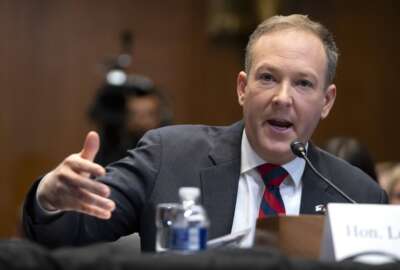House panel debates merits of Senior Exec Service, comes down hard on VA
In examining the viability of the Senior Executive Service, House members called out the Veterans Affairs' compensation program, with a pledge to introduce another...
By Dena Levitz
Federal News Radio
Veterans Affairs leaders came under fire yet again during a Friday House subcommittee hearing in which Ranking Member Stephen Lynch (D-Mass.) pledged to introduce legislation taking back bonuses paid out to wrongdoing senior executives at the agency.
The intended legislation comes on the heels of a number of similar calls for action by congressional members and committees. Last week, Senators Claire McCaskill (D-Mo.) and Kelly Ayotte (R-N.H.) introduced legislation to do what Lynch alluded to, rescind bonuses paid out to VA employees who were discovered to have manipulated electronic waitlists. And in May, the House approved a future ban on VA executive bonuses as an amendment to the Military Construction and Veterans Affairs Act.
The hour-long hearing, to examine the viability of the Senior Executive Service, was held by the House Oversight and Government Reform Subcommittee on Federal Workforce, U.S. Postal Service and the Census.
Lynch, in particular, used much of his time to ask questions related to the VA scandal. Representing the VA, Samuel Retherford, principal deputy assistant secretary of the Office of Human Resources and Administration, explained that his agency does not have the authority to “claw back” performance awards or to downgrade performance ratings once the full investigation into wrongdoing at the VA ends. That answer led to Lynch saying that he planned to bring forward a bill to address this, for which Retherford voiced support.
“I am interested in focusing, like a laser, on those individuals who were culpable in this case and getting back those bonuses and also putting that out as a marker to those in the future who might think about manipulating the process in a way that harms our veterans.”
An evolving evaluation and performance system
While explaining how the VA handles SES performance appraisals, Retherford said the current evaluation process is only in its second year and that there is plenty of room for improvement. For instance, he’s leading a transition to automate the system instead of relying on physical paperwork to do performance management.
Currently, the base rate of pay for SES employees across the federal government ranges from $120,479 to $181,500. The typical compensation package also includes performance awards that are 5 to 20 percent of base pay. Retherford said the VA’s performance awards are being greatly reduced. In 2013, the average amount for bonuses was $9,000, which comes to 5.5 percent of base salary.
Another gap in the VA’s monitoring of performance is that, in a substantial number of cases, the VA has not kept up with the paperwork once an executive is removed and documenting what went wrong. Retherford said he did not know how many SES employees at the VA have been ousted this year. Last year, six were let go and their unsatisfactory performance “was not captured,” he said.
Subcommittee Chairman Rep. Blake Farenthold (R-Texas) expressed concern, additionally, about the “huge amount” of administrative leave being used by VA SES members. In 2011 and 2013, he said, 339 senior executives charged an average of 90 days of administrative leave, compared to the federal government average of four days. Retherford was not able to explain the reason.
Responsibility for senior executives split between OPM and agencies
The hearing wasn’t just about the VA, though.
In a wider discussion about authority over senior executives, Stephen Shih, deputy associate director of Executive Resources and Employee Development at the Office of Personnel Management, broke down the roles of individual agencies compared to OPM.
OPM’s job is to review requests by agencies asking for a specific number of senior executives and to monitor and review the performance appraisal system that each agency creates for itself. It’s the agencies that recruit, assess and hire SES employees, he said. And it’s the agencies that determine pay and bonuses.
He recommended that agencies, in order to be more proactive about weeding out poor performers, pay particularly close attention to how SES members are faring in their first year. That time is considered a probationary period and there’s “great flexibility for agencies to immediately remove them from senior executive service,” he said.
The SES as a ‘place of last resort’
An ongoing theme raised was recruiting and retaining highly qualified workers to become senior executives.
Carol Bonosaro, president of the Senior Executives Association, who testified during the hearing, highlighted several obstacles.
The mistaken perception, she said, is that all senior executives are underperforming even though, in reality, it’s a small subset of bad apples.
That perception does not help encourage achievers to want to enter senior executive roles even though they are critical to agencies, Bonosaro added.
A February survey of 7,000 association members showed that 51 percent rated morale as low or very low. And the rate of retirement for senior executives is up 40 percent since 2009, according to the association’s figures.
“The service [SES] may well become a place of last resort as high performing employees take their skills to the private sector,” she said.
RELATED STORIES:
House passes bill banning SES bonuses at the VA
‘Broken’ pay system driving SES out of government
Copyright © 2025 Federal News Network. All rights reserved. This website is not intended for users located within the European Economic Area.





